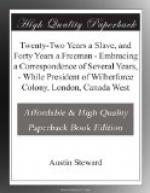The kind old Colonel was placed in the most difficult and unenviable position. His warm heart was filled with sorrow for the loss of his slaves, but not alone, as is generally the case in such instances, because he had lost so much property. He truly regretted the death of his faithful servants, and boldly rebuked the occasion of their sudden decease. When beset and harassed by his neighbors to give up his slaves to be tried for insurrection and murder, he boldly resisted, contending for the natural right of the slaves, to act in their own defence, and especially when on his own plantation and in their own quarters. They contended, however, that as his slaves had got up a dance, and had invited those of the adjoining plantations, the patrol was only discharging their duty in looking after them; but the gallant old Colonel defended his slaves, and told them plainly that he should continue to do so to the extent of his ability and means.
The poor slaves were sad enough, on the morning after their merry meeting, and they might be seen standing in groups, conversing with a very different air from the one they had worn the day before.
Their business was now to prepare the bodies of their late associates for the grave. Robert, the brave African, who had so boldly led them on the night before, and who had so judiciously provided for their escape, was calmly sleeping in death’s cold embrace. He left a wife and five slave children. Two of the other slaves left families, whose pitiful cries it was painful to hear.
The Colonel’s family, deeply afflicted by what was passing around them, attended the funeral. One of the slaves, who sometimes officiated as a minister, read a portion of Scripture, and gave out two hymns;—one of which commences with
“Hark! from the tomb a doleful sound.”
Both were sung with great solemnity by the congregation, and then the good old man offered a prayer; after which he addressed the slaves on the shortness of human life and the certainty of death, and more than once hinted at the hardness of their lot, assuring, however, his fellow-slaves, that if they were good and faithful, all would be right hereafter. His master, Col. Alexander, was deeply affected by this simple faith and sincere regard for the best interests of all, both master and slave.
When the last look at their fellow-servants had been taken, the procession was formed in the following manner: First, the old slave minister, then the remains of the dead, followed by their weeping relatives; then came the master and his family; next the slaves belonging to the plantation; and last, friends and strangers, black and white; all moved on solemnly to the final resting-place of those brave men, whose descendants may yet be heard from, in defence of right and freedom.
CHAPTER III.
HORSE-RACING AND ITS CONSEQUENCES.




